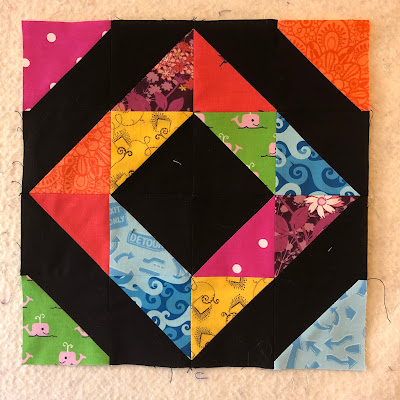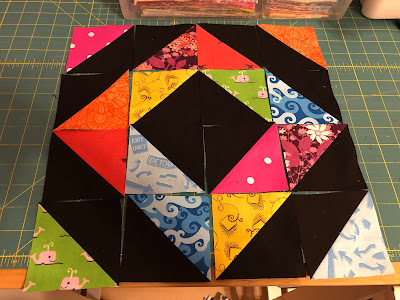This is a helpful guide for anyone who wants to make even 1.5" stripes all the way across the Wanderer's Wife (formerly Gypsy's Wife) quilt by Jen Kingwell. This is only for Section 9 and I'll provide instructions for Sections 8 and 10 once I've got those figured out. This will not replace the pattern, you can get that directly from Jen Kingwell (https://www.jenkingwelldesigns.com/wanderers-wife-booklet) or ask your local quilt shop if they can order it for you.
Some tips before you start: having a consistent scant quarter inch seam is super important for putting this quilt together. I will point out several places where you can do a check to make sure you're sewing exactly the right size seams. If you're having to pull a bunch on your stripes or blocks to make them fit, then your seams are off and it will make all those partial seams so much harder.
I pressed open where ever possible, but there are a few spots where I pressed to one side just because all the bulky seams were on one side and there were no seams on the other side.
I find it best to pin at the end of every seam so that I know that my seams will match up and then I keep gently tension on the pinned end while sewing. If you find yourself tugging a lot to match up the sides evenly, that's not good.
I used my coloring sheet to draw new stripes, which looks like this:
Ok, so we've got 59 stripes across when they're all 1.5" wide.
Please note that my pattern above starts with a red stripe, but I decided I wanted a full set of rainbows, so I ended up adding a red and orange stripe to one side and will be adding a dark blue and purple stripe to the other side. So where I have red in the pattern above, you will see yellow in the images below, orange - green, yellow - light blue, and so on.
So here are cutting instructions (I will only label the sizes if they differ from the original pattern, we have to veer into Section 8 territory here, but that's ok):
Row 1 (yellow): stays the same (the red and orange extra strips I cut at the same size as the yellow)
Row 2 (green): top and bottom pieces stay the same
Row 3 (light blue): top - 1.5"x4.5", bottom - 1.5"x7"
Row 4 (dark blue): top - 1"x3.5", second piece - 1.5"x1.5", third piece - 1"x3", fourth piece - 1.5"x1", bottom - 1"x6.5"
Row 5 (purple): 1.5"x4.5"
Row 6 (red): 1.5"x4.5"
Row 7 (orange): top - 1"x3.5", bottom - 1.5"x4.5"
Row 8 (yellow): 1.5"x7.5"
Row 9 (green): 1.5"x7.5"
Row 10 (light blue): top - 1.5"x7.5", second piece - 1"x2.5", third piece - 1"x1.5", bottom - 1.5"x8.5"
Now to put this beast together...
First step, add the strips to the blocks next to them:
So that's the dark blue added to the right side of the smaller square in a square block, the dark blue added to the left side and the orange added to the right side of the top square in a square block, the dark blue to the left side of the pinwheel block, and the light blue to the right side of the Old Maid's puzzle block (mine probably looks different than yours because I changed it up a bit). I pressed to the side of the stripe on all but the pinwheel block, that seam I pressed open.
Next we will sew the strips together:
The green and light blue stripes at the top should now be 2.5" across (if they are not exactly that size, this is a good time to dial in your scant quarter inch seam). The purple, red, and orange strips should be 3" across, and the yellow, green, and light blue strips should also be 3" across. I pressed all of those seams open.
Next up is attaching our partial seams - do not sew the whole way, stop at no less than 3/8" from the end, but as close to 3/8" as possible to make it easier for yourself later:
We're attaching the dark blue to the top right and bottom right of the smaller square in a square, the light blue to the right top of the pinwheel block, and the light blue to the right bottom of the Hope of Hartford block. I pressed the square in square pieces to the strip side, and pressed the other two open.
The next step is to attach the purple/red/orange strip set to the right of the smaller square in a square portion (it should measure 6.5" across). I pressed to the strips:
Next we will attach the top square in square section to the smaller square in square section (I pressed to the strips):
The next step is to add the green and light blue section to the left side and yellow/green/light blue section to the right side - make sure that you fold the smaller square in a square out of the way so you don't catch that while sewing on the left section and pin at the end of the seam because it's a small space and will want to shift on you. I pressed open:
Now we will finish the partial seam. We're working with a very small area here, so be careful. I like to tack back over the last few stitches. I pressed to the strips:
Now comes the real test of your seam allowance. The first set of strips I did this with, the pinwheel section and the square in square sections did not line up at all, I had to really pull on the stripes to fit my pinwheel block and they look distorted as a result (image at the very end). I measured all of my stripes and each one was just a hair short of 1" wide and over the length of a couple stripes that really starts to add up. So here we go, add the pinwheel section to the square in square section, I pressed open:
Next step - sew the light blue piece to the section we've been working on. I pressed open:
Attach the Hope of Hartford section next (I pressed open). Another check here - the first seam in the Hope for Hartford block should match up with the edge of the pinwheel block, and second seam should line up with the center of the pinwheel block:
Now we will attach the green strip to the left side of the section (I pressed open). Make sure you're folding the square in square section out of the way so it doesn't catch, and pin the ends because it will want to shift on you:
Next step - complete the partial seam by the smaller square in a square block. Back tack at the end of the seam where it overlaps with the existing seam you've already sewn (I pressed to the strips):
Now we can add the Old Maid's Puzzle section (I pressed open). Here's another seam check - the middle of your Old Maid's Puzzle should line up with the first seam in the Hope of Hartford block:
And finally, we're going to attach our yellow strip (or in my case my red/orange/yellow stripe section) to the rest of the section (I pressed open):
And we're done with Section 9! Just in case you wanted to see just how distorted my first attempt was where I wasn't checking my seams properly, here's a picture (you can see the bowing where the stripes meet the pinwheel block, where I had to really tug on them to get them to line up properly):























































